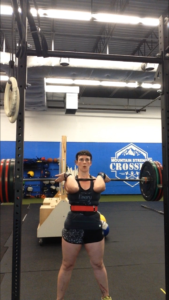As an athlete, I like to think of myself as a perpetual student. My form can always be better; I will always have more to learn about nutrition; a fresh set of eyes will always see something different in my lifts. I’ve also spent a lifetime as a teacher of movement arts: a fight director, ballroom dance instructor, and (way back in the day) swim instructor. I’ve been on both sides of this table.
As a teacher, I make frequent corrections. My students are with me to learn; what I have to show them is something they aren’t experts in. I know more than they do and I see what their bodies are doing with an outside eye. As a result, I’m in a position to note when something they are doing isn’t quite right. The more I correct their form, the more they can grow in whatever movement they are learning from me.

My coach definitely had things to say about my elbows in this front squat
I’ve noticed a knee-jerk reaction in my students to immediately apologize for whatever they are doing wrong. “Hey, the lead on that is coming a bit too soon. You’ll want to wait until the next beat to execute it.” “Oh! Sorry!”
It breaks my heart when students do this. Mistakes are a crucial part of the learning process. When you’re doing something new, or doing something you hope to become better at, you’re inevitably going to do it wrong many many times before you finally get it right. That’s why we practice; that’s why we drill. Being a student is all about making mistakes. It’s a matter of how we react to these mistakes that determines what type of student we are, and how quickly we will excel in the given movement form.
As a result, I never apologize to my coaches when they give me notes on my form. My knees coming together in a squat or my back arching a bit too much in a deadlift are not things to be sorry for. These are elements of the learning process; inevitable foibles that are required to move forward.
So I say “thank you.” I don’t try to explain what’s going on (unless what my coach is telling me contradicts something I thought was correct); I don’t apologize for the mistake; I don’t make excuses. I simply thank my coach and try to do it better next time.
Saying “thank you” also communicates to my coach that I am listening, paying attention, and respecting their expertise. It expresses the truth: that I am grateful for the help and for their expert eye, as well as their devotion to helping me get better at whatever it is I’m doing.
Don’t get me wrong; there are some mistakes that warrant an apology. Any mistake in which you are actually at fault for something will want to be accompanied by “I’m sorry.” Being late to class, stepping on someone’s toe, or accidentally grabbing someone else’s jump rope from the equipment stack (for example) are all moments where an apology is more than appropriate. The inevitable by-products of the learning process in a physical discipline? Not one of these moments.
So try it; see what happens. Don’t apologize for mistakes that only effect you. Learn from them, grow from them, and see what they can spring-board you into.

